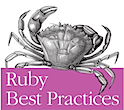 Ruby Best Practices is a book by Gregory Brown (and published by O’Reilly) that looks into the “Ruby way” of doing things in the Ruby language and, specifically, why Rubyists tend to write Ruby the way they do. It’s an engaging book and we took a look at it and interviewed Gregory Brown about it just over a year ago.
Ruby Best Practices is a book by Gregory Brown (and published by O’Reilly) that looks into the “Ruby way” of doing things in the Ruby language and, specifically, why Rubyists tend to write Ruby the way they do. It’s an engaging book and we took a look at it and interviewed Gregory Brown about it just over a year ago.
Gregory always wanted to be able to give away his book with a Creative Commons license eventually and O’Reilly have kindly allowed him to start doing that, a chapter at a time. So far, the first five chapters are available to download at GitHub (in PDF format). Read More


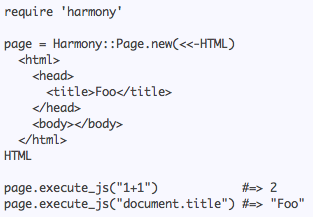

 Sick of Rails 3.0 yet or still enjoying your
Sick of Rails 3.0 yet or still enjoying your  Whenever something’s a really “big deal” in the Ruby world, we cover it – even if it makes more sense on
Whenever something’s a really “big deal” in the Ruby world, we cover it – even if it makes more sense on 
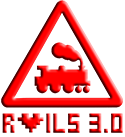 Today, Rails core member Jeremy Kemper dropped the words that lots of ardent Rails developers have been waiting for: “Rails 3 beta is LIVE.” It’s true! Rails 3.0′s first approved beta/pre-release version is
Today, Rails core member Jeremy Kemper dropped the words that lots of ardent Rails developers have been waiting for: “Rails 3 beta is LIVE.” It’s true! Rails 3.0′s first approved beta/pre-release version is 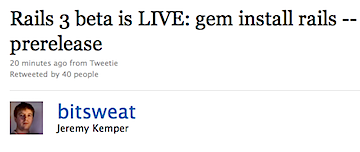

 Ruby’s creator and benevolent dictator Yukihiro “Matz” Matsumoto has
Ruby’s creator and benevolent dictator Yukihiro “Matz” Matsumoto has 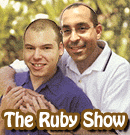 If you try to keep up with the Ruby community you’re probably familiar with the
If you try to keep up with the Ruby community you’re probably familiar with the 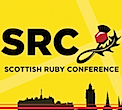 If you fancy a trip to the land of fried confectionary and heart disease, the Scottish Ruby Conference (previously Scotland on Rails) is selling tickets for its third event:
If you fancy a trip to the land of fried confectionary and heart disease, the Scottish Ruby Conference (previously Scotland on Rails) is selling tickets for its third event: 
 Norwegian Rubyist
Norwegian Rubyist  One of the biggest benefits of bringing Merb developer Yehuda Katz on board to work on Rails 3.0 has been his relentless pursuit of extracting out all of Rails’ magical abilities from their monolithic encasings and into separate, manageable chunks. A case in point is
One of the biggest benefits of bringing Merb developer Yehuda Katz on board to work on Rails 3.0 has been his relentless pursuit of extracting out all of Rails’ magical abilities from their monolithic encasings and into separate, manageable chunks. A case in point is